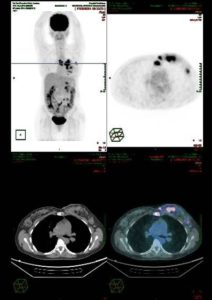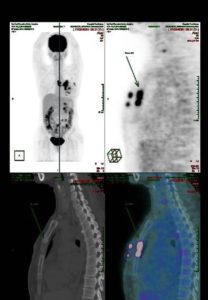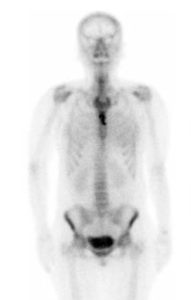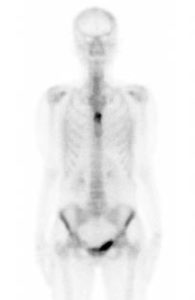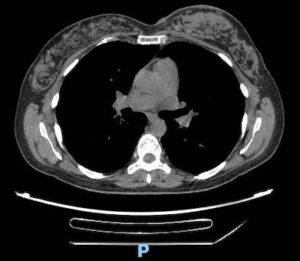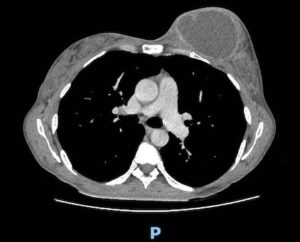Ketogenic Metabolic Therapy.
The patients of these three case reports were seen in The Clinic Integrated Medicine, a Medical private clinic in Belo Horizonte, Brazil. All patients were personally treated by me and my multidisciplinary team.
Case 1- Stage IV Breast Cancer Treated with Ketogenic Metabolic Therapy
This case report aims to show a quick response of stage IV breast cancer to ketogenic metabolic therapy, with improvement of the characteristics of sternum metastasis and liquefaction of part of the breast tumor after high dose intravenous Vitamin C (IVC). We also performed thermography to follow up response to treatment, which is a non-contact, non-invasive, and non-ionizing radiation tool used for detecting breast lesions. Thermography is a functional examination aimed at looking for changes in the temperature distribution on the breast surface caused by, among other things, metabolic activity.
The patient was female, 48 years old, diagnosed with left breast cancer on March 31st, 2021. Nuclear Magnetic Resonance (NMR) in 17/03/2021 showed an irregular nodule in her left breast as well as other irregular nodules in the central part and inferior quadrants of the left breast and an intramammary lymph node and left axillary lymph node, all suspicious for neoplasia. A bone scintigraphy in May 13th showed sternum metastasis.
Her tumor was HER 2 negative, and it was positive for estrogen and progesterone receptors. She began ketogenic metabolic therapy with supplements intended to inhibit cancer metabolic pathways and also to stimulate anti-tumoral immune response. She was also receiving Zoledronic Acid, Letrozole, Palbociclib, and Goserelin, prescribed by her oncologist.
- Figure 1 Nuclear Magnetic Resonance(NMR) March 17th 2021
After 3 months of ketogenic metabolic therapy, her second bone scan was performed on October 5th and the lesions in the sternum were defined as sclerotic compared to osteolytic from the first CT scan. Also, the intramammary lymph node was not present anymore and the other axillary lymph nodes had diminished in size.
- Figure 2 Bone Scintigraphy May 13th
- Figure 3 Bone Scintigraphy October 5th
She continued the ketogenic metabolic therapy diet always keeping track of her Glucose Ketone Index (GKI), which was always under 3.

Figure 4 GKI: Glucose-Ketone index
We performed a Thermographic image (left) in November 14th, which showed accentuated thermal asymmetry with greater activity in the left breast, with diffuse hyper-radiant areas, breast parenchyma and extending to the sternal and mammary region on the right breast, compatible with cancer diagnosis.
From November 28th to December 15th, she received high doses of Intravenous Vitamin C (IVC) three times a week beginning with 30g and reaching a dose of 50g/dose, together with rectal ozone therapy.

Figure 5 Left: Thermography in November 14th 2021. Right: Thermography in November 30th 2021
Second thermography after 2 weeks of high dose IVC (right image) showed moderate thermal asymmetry with decreased parenchymal breast temperature on the left breast compatible with decreased local metabolic activity possibly induced by ongoing treatment, suggesting a liquid collection.
A new Computerized Tomography (CT) scan was performed on December 29th, showing a 200mL liquid collection, of a possible necrosis or liquefaction in her left breast. Axillary lymph nodes displayed central necrosis.
Below: First CT scan in June 17th, 2021 and the last CT scan after the IVC protocol, requested by the oncologist motivated by the thermography results. The CT scan in the right shows the liquid collection of tumor necrosis.
- Figure 6: Computer Tomography (CRT) Scan June 17th 2021
- Figure 7 CT Scan December 29th 2021
Motivated by the metabolic treatment results, her oncologist suggested surgery, a rather extensive one. Right after, she presented with several non previously existing metastasis. She then began a new protocol with sonodynamic and photodynamic therapy, intravenous high doses of vitamin C and Dichloroacetate, adjuvant to chemo and radiotherapy, which are in progress, with good results at the moment.
Ketogenic metabolic therapy is a promising adjuvant therapy in advanced breast cancer treatment. Thermography is a very interesting, low- cost and noninvasive tool to follow up response to treatment in cancer patients.
Case 2- Grade 3 Glioma and Complete Response with Standard of Care and Ketogenic Metabolic Therapy
This case report shows a complete response of Grade 3 Glioma (Anaplastic Astrocytoma) with standard of care and Ketogenic Metabolic Therapy, using ferroptosis protocol cycled with other supplements. The patient was male, doctor (anesthesiologist), 38 years old. On January 3rd, 2020, diagnosed with a tumor in his left frontal lobe, corpus callosum invading also right frontal lobe. He underwent surgery on February 6th, 2020, where 85% of the tumor was resected, followed by 30 days of radiotherapy and temozolomide, followed by a second surgery in April 2020. He used Bevacizumab and started ketogenic diet on his own, one month after surgery.
He came to my clinic on September 3rd, 2020, and began metabolic treatment, keeping his Glucose-ketone index (GKI) always under 3, sometimes under 1. He was on temozolomide 5 days a month.
Since his exams showed high ferritin levels, I began a ferroptosis protocol, which is a means of inducing apoptosis with the tumor´s own iron reserves, with oral supplements.
After 3 months of ferroptosis protocol his exams improved considerably and his Nuclear Magnetic Resonance (NMR) had no new lesions. He continued the ketogenic metabolic therapy cycling supplements and strategies.
This patient has a grade 3 glioma with 2 years and 4 months of survival (about 27% of people diagnosed with a high-grade astrocytoma live for five years or more, the median survival time is 3 years) with excellent quality of life. He is an anesthesiologist; he is currently working regularly and is very physically active. He just turned 40 years old, and this picture was taken in March 2022. His tumor hasn´t recurred. His Temozolomide was withdrawn in November 2021.

CASE 3- Triple Negative Stage 3 Breast Cancer and Complete Response with Chemotherapy and Ketogenic Metabolic Therapy
This case report aims to show a quick and complete response of stage IV breast cancer to standard of care supported by ketogenic metabolic therapy.
The patient was a 35 years old female, diagnosed in July 2020 with a triple negative breast cancer. Her Ki67 was 82%.
Nuclear magnetic resonance (NMR) in October 6th showed a malignant breast cancer in her right breast of 2,8cm, locally advanced with muscle infiltration of 0,9cm, and mass of lymph nodes fused in her right axilla measuring 2,5cm. She had multiple foci of 0,5cm bilaterally in both breasts. On September 9th, 2020, she started doxorubicin and cyclophosphamide every 2 weeks and metabolic ketogenic therapy. She fasted 1 day before until 1 day after every chemotherapy session (60-70h fasts). She was prescribed oral drugs and supplements to support metabolic treatment and hyperbaric oxygen therapy 1 day before and on the chemotherapy day, after the sessions.
NMR on November 23rd, after 4th dose of chemotherapy showed complete response (no tumor) in her breast and axilla.

She then started carboplatin every 21 days and paclitaxel weekly until surgery (March 2nd, 2021).
Surgical pathology results showed neither signs of in situ nor any other signs of cancer and no lymph nodes positive for metastasis. After surgery she underwent 25 sessions of radiotherapy. Last pet scan was performed on 29/11/2021 with no signs of relapse.
This is an unexpected, rapid and positive response of an aggressive breast tumor to ketogenic metabolic therapy adjuvant to standard of care.
More and more case reports like this and some clinical trials are showing that ketogenic metabolic therapy is a very interesting adjuvant treatment option, that could be considered in the standard of care treatment of breast cancer.
Ketogenic metabolic therapy for cancer is a very interesting strategy for treating such a complex, multifactorial disease, For the last years I have been treating cancer patients, with ketogenic diet, fasting, fast mimicking diet, ozone and hyperbaric therapies and oral and intravenous drugs and supplements in order to inhibit cancer metabolic pathways and to stimulate the immune system of these patients. I bring here three cases, two patients with breast cancer and one patient with a grade 3 anaplastic astrocytoma. They all received ketogenic metabolic therapies, individualized for each patient. We must show our medical community that cancer is indeed a metabolic disease and therefore treatments must include strategies that dynamically modulate metabolism.
Written by Janaina Koenen Fonseca M.D

